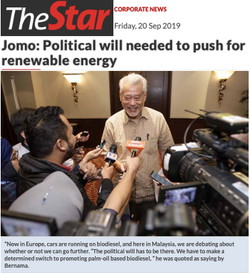- Dec 23, 2025
- 4 min read
Updated: Feb 2
Note: A critical response to this article, from Ambassador Byron Blake of Jamaica is available here
KUALA LUMPUR, Malaysia, Dec 23 2025 (IPS) - Opinions have been divided over the annual UN climate conferences. While some see COP30 in Belém, Brazil, as confirming their irrelevance, others see it as a turning point in the struggle for climate justice.
Accelerating decline
Negotiations continued there as the 1.5°C target slipped beyond reach.
As the world accelerates toward catastrophic warming, ecological systems are collapsing, and millions across the Global South face increasingly life-threatening situations.
Rising sea levels, extreme heat, droughts and flooding are undermining food security, displacing communities, and exacerbating inequality and living conditions.
The economic costs of climate disasters are accelerating. Social and human costs continue to rise, with lives, livelihoods and ecosystems destroyed.
Fiscal austerity and indebtedness are making things worse. Instead, governments increase military spending and subsidise fossil fuels, accelerating planetary warming.
Business interest in ‘green transitions’ focuses on new profit-making opportunities. As renewable energy grows, energy supplies increase as fossil fuels are slowly replaced.
COP of Truth?
In his opening speech to the thirtieth Conference of Parties (COP30) in Belém, host President Luiz Inácio Lula da Silva promised it would be the ‘COP of Truth’.
He urged world leaders and governments to demonstrate their commitments by presenting their nationally determined contributions (NDCs) for its Global Mutirão (community mobilisation) outcome.
Although not officially present, the US continued to frustrate the climate talks by urging petrostates to resist efforts to reduce reliance on fossil fuels.
The COP30 Climate Change Performance Index exposed governments’ weak commitments to combating planetary warming over the past 21 years.
Its report analysed the policies of 63 countries responsible for 90% of the world’s greenhouse gas (GHG) emissions.
The top three spots were kept empty to emphasise that no country has shown sufficient ambition to do so.
For 2025, Saudi Arabia took last place, with the US, Russia and Iran not far behind. Trump’s latest policies have set the US further back.
Meanwhile, the White House threatened sanctions and tariffs against governments that support a global tax on GHG emissions by international shipping.
Just transition?
COP30 in Belém continued to fail to achieve what is urgently needed: binding GHG emission cuts, phasing out fossil fuels, meaningfully compensating for past losses and damages, or better financing for climate adaptation.
COP30 adopted the Belém Mechanism for Just Global Transition – a new UNFCCC arrangement to overcome the fragmentation and inadequacy of such efforts worldwide.
However, the mechanism lacks both finances and plans to protect those harmed by decarbonisation initiatives. Nor are there resources for ‘green industrialisation’.
Climate justice is still misrepresented as threatening livelihoods rather than as key to survival. The climate justice movement must convince the public that it is key to social progress.
Climate finance setback
Lula appealed again for increased climate financing for the Global South following the dismal record since the 2009 Copenhagen COP.
Brazil also launched the Tropical Forests Forever Fund (TFFF) to incentivise countries conserving their forests. Although it failed to raise its target of $25 billion, 53 countries endorsed the TFFF, with pledges in Belém totalling $6.6 billion.
Belém also offered new suggestions for climate finance, in its ‘Baku to Belém (B2B) Roadmap to 1.3T’ (USD1.3 trillion), and the report of the COP30 Circle of Finance Ministers (CoFM).
The CoFM involved 35 finance ministers representing three-fifths of the world’s population and its GHG emissions.
The COP30 promise to “at least triple” finance for developing countries’ climate adaptation by 2035 was again blocked by the Global North. LDC requests for grant financing were also ignored yet again.
Promoting voluntarism
Brazilian COP30 chair Corrêa do Lago proposed various compromises to encourage those disappointed by UN processes to take climate action.
His proposed ‘voluntary roadmap’ to transition from fossil fuels will be discussed at the Colombia/Netherlands-led ‘coalition of the willing’ conference in April 2026.
The chair’s other voluntary roadmap for forest conservation followed the COP30 agreement’s failure to condemn deforestation with stronger language.
The adoption of the 59 compromise indicators for the Global Goal on Adaptation was delayed by poorer African countries’ inability to afford immediate implementation. The compromise was a two-year delay, referred to as the ‘Belém-Addis vision’.
Belém as turning point
For the first time, the US was officially absent from the Belém COP. With over 56,000 delegates registered, attendance was second only to Dubai, with more than 1,600 business lobbyists present.
COPs make slow progress by painstakingly extending the consensus for climate action. Belém may shift the COPs’ focus from negotiations to initiatives, a precedent which can be abused or advanced.
Belém’s Mutirão Decision (Action Agenda) focuses on delivery, drawing from the ‘whole of society’. Its 30 measurable
Key Objectives were based on the 2023 Global Stocktake.
While Belém’s outcomes fell short of most expectations, many acknowledge Brazil did its best under trying circumstances. Nonetheless, climate justice is being denied by the continuing procrastination of powerful vested interests.
Although not quite the ‘COP of Truth’, inclusion and implementation that Lula promised, Belém reversed the backward slide of recent COPs, which the Global South must build upon before it is too late.
Related IPS Articles:
Available online here: Climate Justice Denied by Delays

















